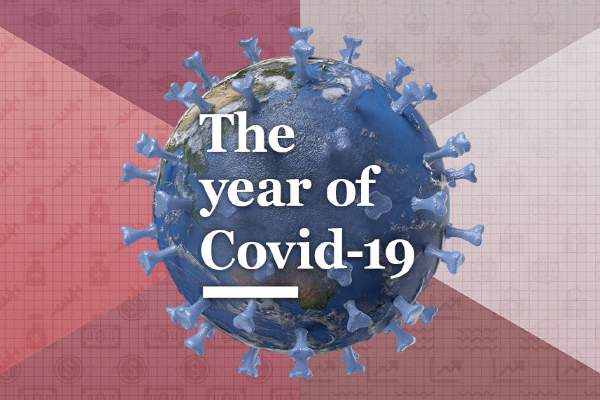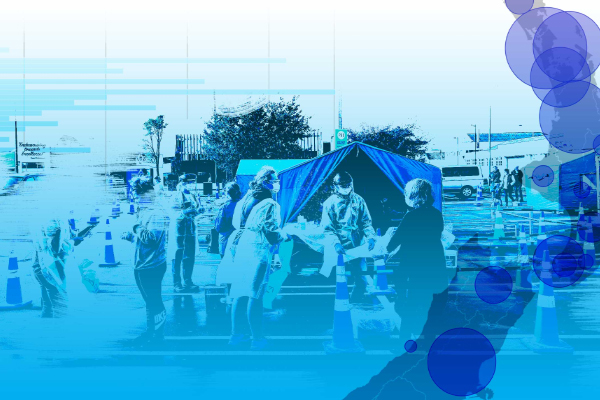Protecting
Paradise
Vaccinating the islands Covid-19 forgot



As Covid-19 ravages the world, forcing unprecedented lockdown measures and causing millions of deaths, the 15 islands and atolls that make up the Cook Islands are yet to see a single case.
But its virus-free status — shared by only 13 other countries worldwide — came at a price. The threat of the virus and subsequent border closure sent once-heaving businesses into hibernation, putting its tourism-reliant economy in dire straits.
So when the first batch of “precious” vaccines landed in Rarotonga on May 18, coinciding with the newly opened and much-anticipated New Zealand travel bubble, there was a sense of relief and hope for the freedoms it may bring.
But freedom is fragile and there’s much at stake, as Hannah Martin reports.
The Cook Islands has been spared the worst of the pandemic, but with the bubble open things could change in an instant.
It’s raining as the first quarantine-free flight from Auckland touches down in Rarotonga, mist settling on the craggy mountains commanding the heart of the island.
Cook Islanders consider rain a blessing during events of significance: particularly auspicious as the plane is carrying more than just passengers — it’s carrying the promise of a more normal life.
Onboard flight NZ940 are the first 302 travellers the country has seen in more than a year, each breaking into cacophonous applause on arrival.
Tucked away in the cargo hold are the first 405 vials of Pfizer/BioNTech vaccine.
The flight, and its contents, represented a first step: the beginning of an 80-day programme which will see 10,189 Cook Islanders vaccinated.
It also heralded the start of New Zealand’s vaccine roll-out to the Pacific, with Aotearoa set to provide enough doses for at least 1.2 million people in the coming year.
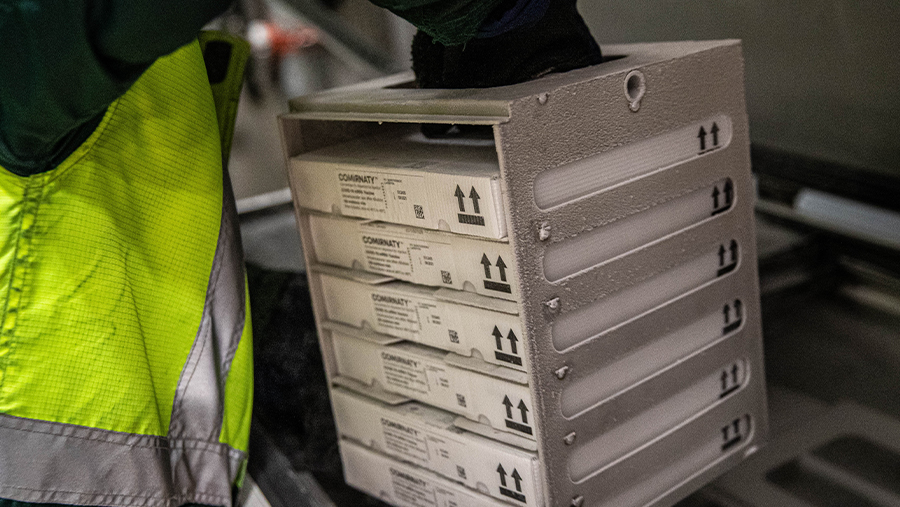
Pfizer Covid-19 vaccines are pulled from a freezer in Auckland, where they are kept at between -80 and -82 degrees.
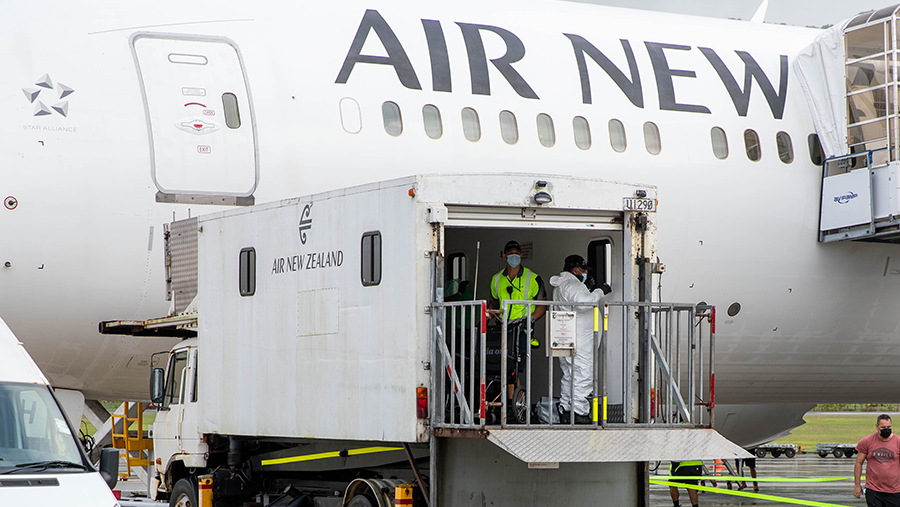
The first shipment of Covid-19 vaccine bound for Rarotonga is packed into the cargo hold.
Rarotonga, the largest and most populous of the Cook Islands, is untypically quiet in the days following that first flight.
Smatterings of tourists scooter along the main road, but stretches of sand and beachfront loungers are mostly empty.
These moments are tranquil, but underscored with the knowledge its Covid-free status could be lost if just one thing went wrong. If one person with the scratchy start of a sore throat didn’t get tested before setting off on holiday; or if a leak at the border went undetected.
It’s a tension widely felt and the question of why there was not more time to vaccinate the country before the border opened comes up often.
Minister for Pacific Peoples Aupito William Sio says New Zealand committed to getting vaccines to the Cooks at the “earliest possible time”. Planning for the roll-out and two-way quarantine-free travel bubble were undertaken in parallel, rather than one being contingent on the other. But no time is wasted once those prized vials arrive.
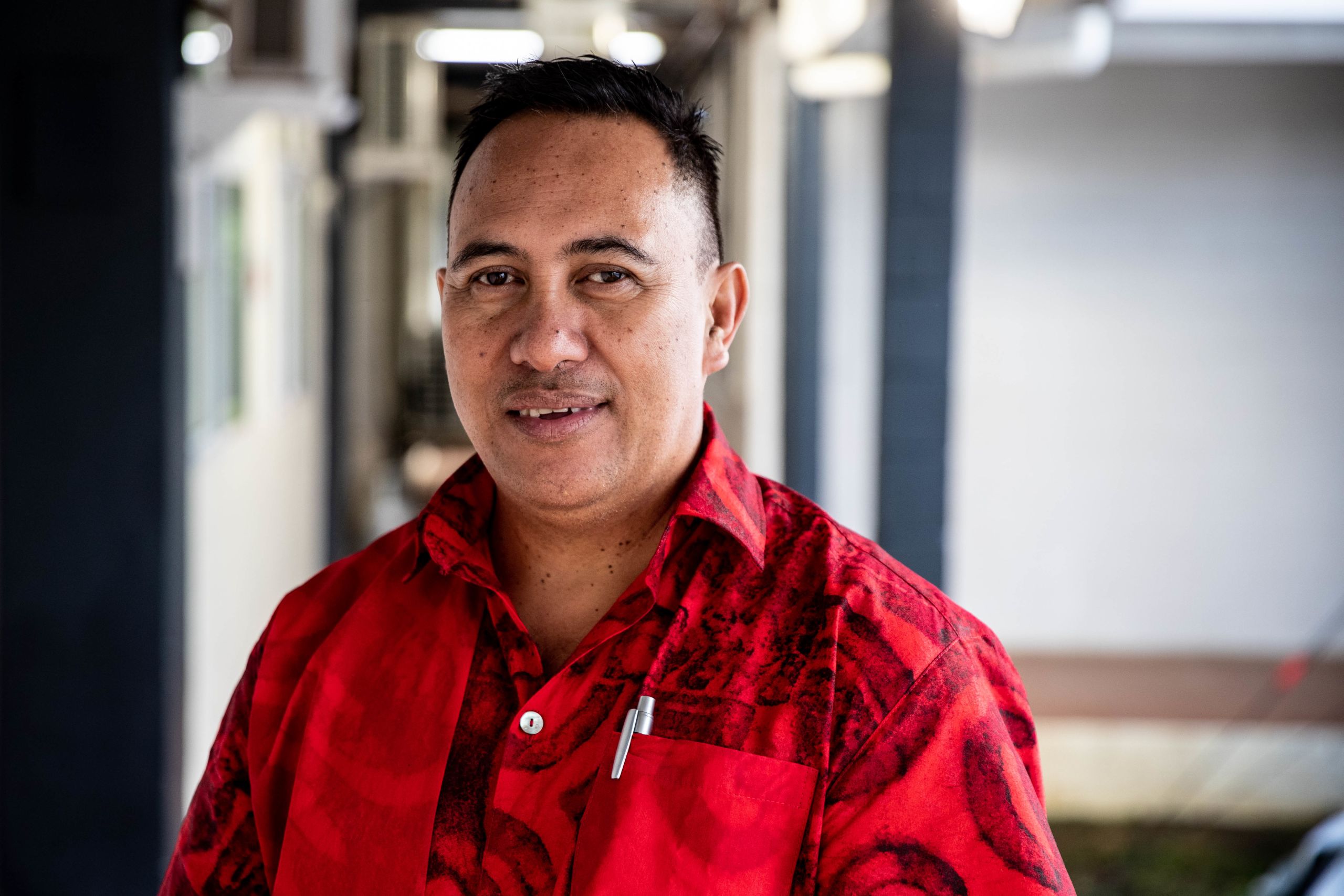
Health Secretary Bob Williams.
Health Secretary Bob Williams.
The first shipment touched down in Rarotonga at 2.20pm on May 17 (local time).
Less than three hours later, Health Secretary Bob Williams rolled up the sleeve of his red button-down to become the first person vaccinated, alongside 31 others jabbed that day.
After completing his 20 minutes’ observation, Williams felt “awesome”. The otherwise painless moment was a “milestone” — the start of a new chapter.
With the population scattered across many islands, vaccinating in the Cook Islands is a big task.
On the morning of the roll-out’s first full day, the atmosphere at the Nikao social centre, where border and frontline health workers park their cars and wait for their ride up to Rarotonga hospital, is jubilant.
Rhythmic drumming music echoes around the clearing, the air carrying with it the scent of doughnuts and coffee to satiate workers for the long day ahead.
A dozen people bundle into a hospital shuttle bus, snaking up the hill to be welcomed by a chorus of "Kia orana, aere mai".
Met by the Cook Islands Health Ministry Te Marae Ora, and Red Cross staff in shirts emblazoned with "Operation Pfizer 21", each person is given a dollop of hand sanitiser and a disposable face mask.
It is the first time some have had to wear a mask since the pandemic began.
Once jabbed, people filter through to the observation tent, overlooking the turquoise waters of Arorangi. Hawk-eyed doctors and nurses watch for signs anyone is feeling unwell, while outside the canvas walls, roaming chickens peck at the sodden grass.
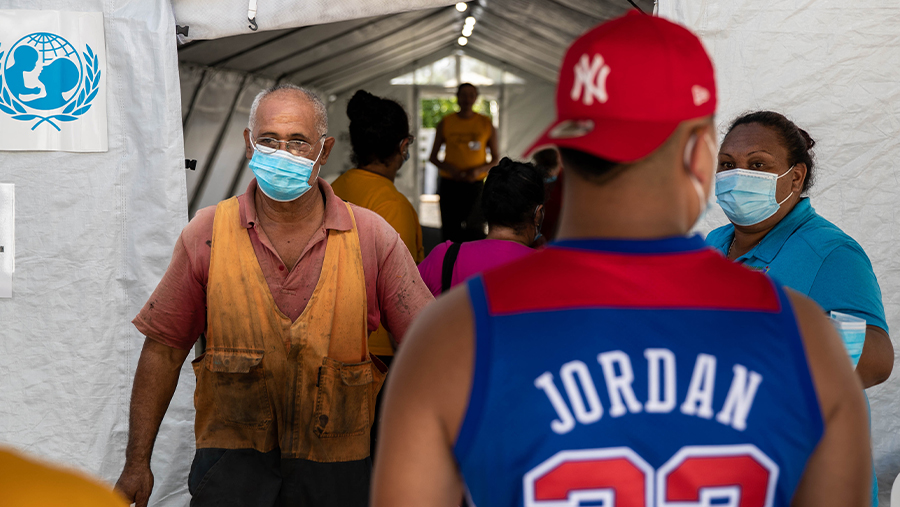
Hundreds of people come to Rarotonga Hospital to be jabbed in the first week of the roll-out.
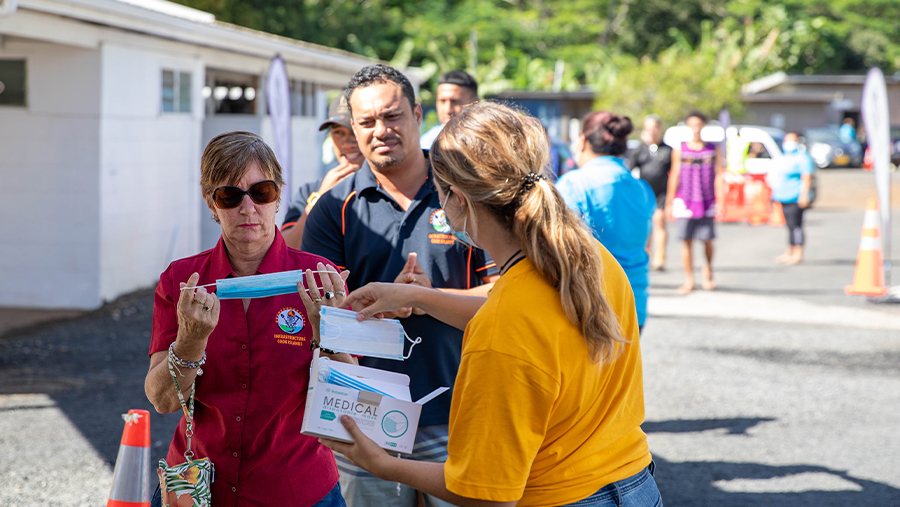
Everyone must mask-up before getting vaccinated.
Eyes crinkle as people smile behind their masks, plasters stamped on their upper arms.
In typical tropical fashion, the weather turns quickly and often but as rain lashes down, spirits are high.
In a back room, tucked away from the noise, Charlie Emmanuela and a handful of other nurses have been working since 5.30am.
She is among five people on the dilution team, whose job it is to reconstitute the vaccine with saline and painstakingly draw out the five, six or seven doses each vial allows.
A nurse practitioner in public health, Emmanuela says getting started was nerve-wracking.
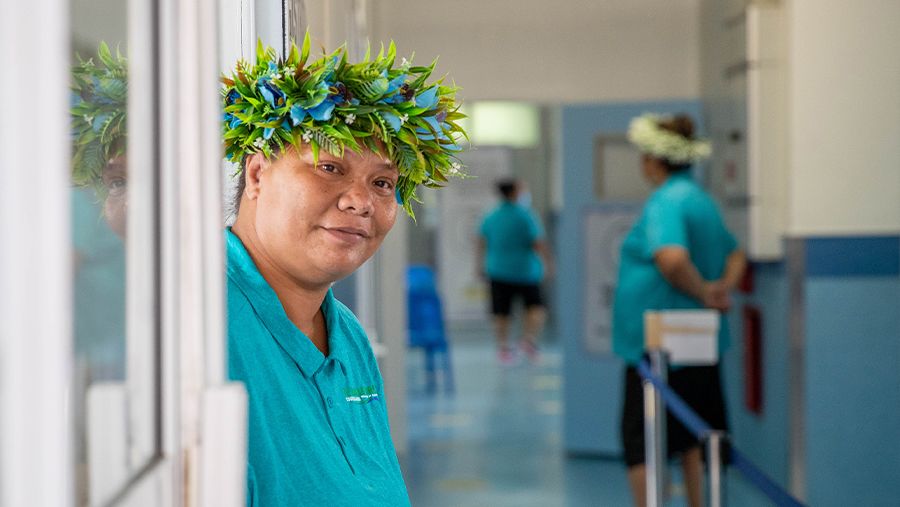
Nurse Charlie Emmanuela.
Nurse Charlie Emmanuela.
Once the fridge is opened, they have two hours to dilute the vaccine. Once diluted, there are six hours before it can no longer be used. By midday on the first full day, they'd drawn about 70 vials — approximately 420 doses.
"So far, so good, we're just waiting for the people now," she smiles.
The people come. There are so many in the first few days that the island exhausts its first supply and has to delay the next scheduled vaccinations to allow for a second shipment to land.
Fewer than 10 days into the roll-out, approximately 80 per cent of people on Rarotonga had received their first dose, once again outstripping supply.
The steady demand made for a long week for Apii Mateariki, the charge nurse for public health at Rarotonga Hospital.
Like the majority of the island's nurses, she has been pulled onto the frontline as a vaccinator.
Twelve hours a day, save for breaks, Mateariki sits in a curtained cubicle — calling people in, chatting, jabbing; repeat.
The shifts are long and hot, even as winter descends. She and 14 other vaccinators arrive at the hospital by 6am.
Before the sun rises, staff begin the day with a collective song and prayer. The work they are doing is sacred.
But Mateariki's effervescence is unshakable.
"I don't know where we get the energy from, [but] we're excited, it's a new day."
Though there are interludes where the booths are more solemn – as nurses run through the risks, benefits and potential side effects before gaining consent – raucous laughter often rings out.
It was "scary" giving the vaccine for the first time, Mateariki says. "We know what our people are like, they're scared to come.”
But watching the number of vaccinated people growing day by day, she felt "proud of the turnout for our people".
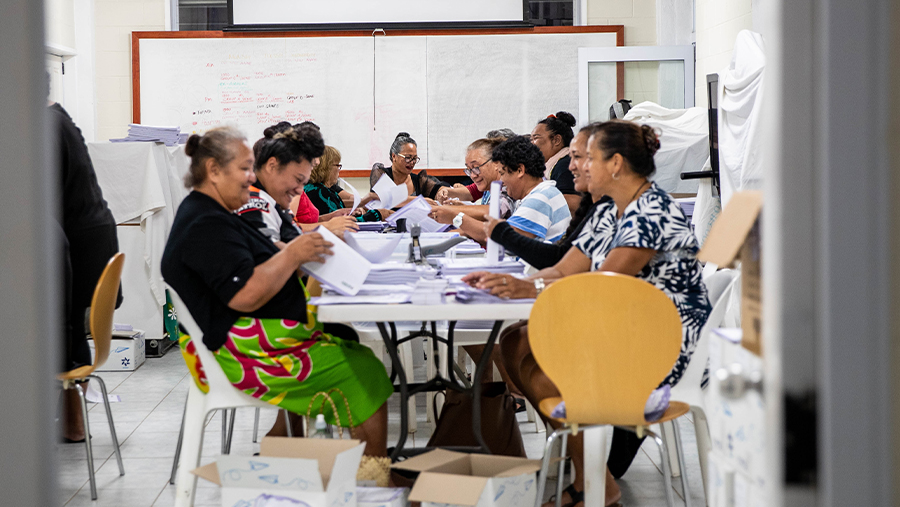
The roll-out takes a village: Registration forms are sorted through in a back room at the hospital.
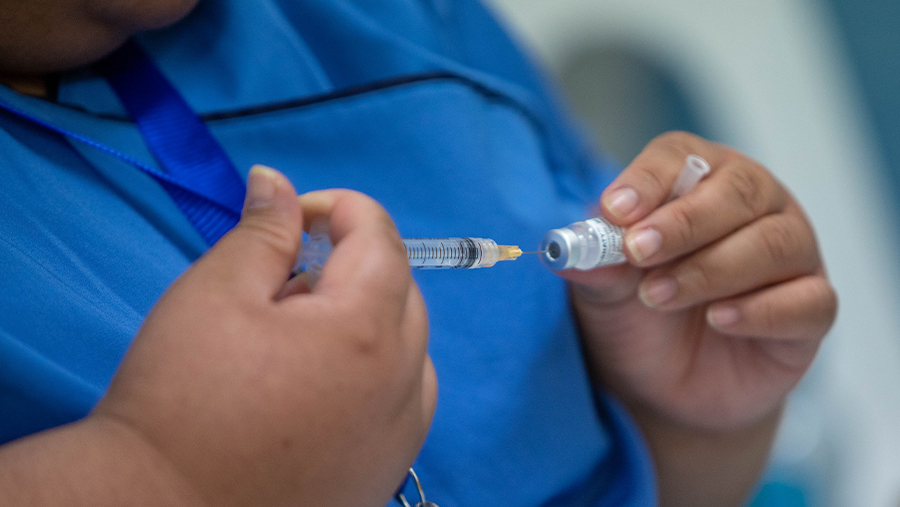
The Pfizer vaccine being prepared for use.
Back in the booths, a vaccinator hands over a small purple and white card – proof the patient received his first dose, with a plea to keep it safe. “This is your passport to the world,” she says, smiling.
In her office upstairs, never far from the action, Dr Yin Yin May didn’t expect to be at the helm of the Cook Islands’ Covid-19 vaccine roll-out.
May, head of health services at Rarotonga Hospital, feels “very responsible” for the success of the process.
She was the second person in the country to receive the vaccine. “This is a very big moment,” she says.
The roll-out is the first ever mass vaccination programme for adults in the Cook Islands, a colossal undertaking, and one which “means a lot” to her.
“I feel very privileged to be part of this.”
Softly spoken and always smiling, she is everywhere at once – poised to act if anyone needs her, or if anything goes wrong.
Unlike in New Zealand, where people have some choice about where and when they are vaccinated when called up, here the process is “really tight”.
People can’t miss their opportunity to receive a jab. Once it’s gone, it’s gone.
After the first round of vaccination in Rarotonga ends on May 31, staff head to the island of Aitutaki to vaccinate for three days, before returning to Rarotonga to start a 14-day stint of second doses, and later moving on to the Pa Enua (outer islands).
The northern group of islands are farther flung. Some don’t have airstrips, making them accessible only by boat.
While officials aim to reach Pukapuka – one of the most isolated of the Cooks, about 1140km from Rarotonga – next month, the New Zealand Defence Force may be required to get vaccine to other remote atolls.
There is a lot of pressure. May needs to order the correct amount of vaccine at least 72 hours before it is required.
By the end of the first week of vaccination, not a single dose had been wasted.
“We understand how precious it is,” she says.
With the bubble opening, some in the Cook Islands are worried about Covid-19 getting “round in a flash”.
Though the vaccine is a welcome step towards the islands opening up again, the potential fallout from Covid-19 looms large. Just a handful of cases could overwhelm the Cook Islands.
As a realm country, Cook Islanders are New Zealand citizens, and rely on Aotearoa's healthcare system. New Zealand is a safety net, and will be in the event of an outbreak.
If one person tests positive, the Cooks would call on New Zealand to speed up and co-ordinate contact tracing.
The health system – already operating with scant resources – has been shaken up in the face of Covid-19.
During the throes of the pandemic, the health ministry shifted Rarotonga Hospital's emergency department and outpatient care to the Tupapa community health clinic.
There are just two emergency beds at Tupapa for the whole population, compared with six at the hospital.
Tupapa’s dental services are emergency only, and elective surgery has been paused during the roll-out.
Sitting in the modest clinic, Te Marae Ora’s Director of Public Health Dr Tereapii Uka says this is a week the country has been waiting for.
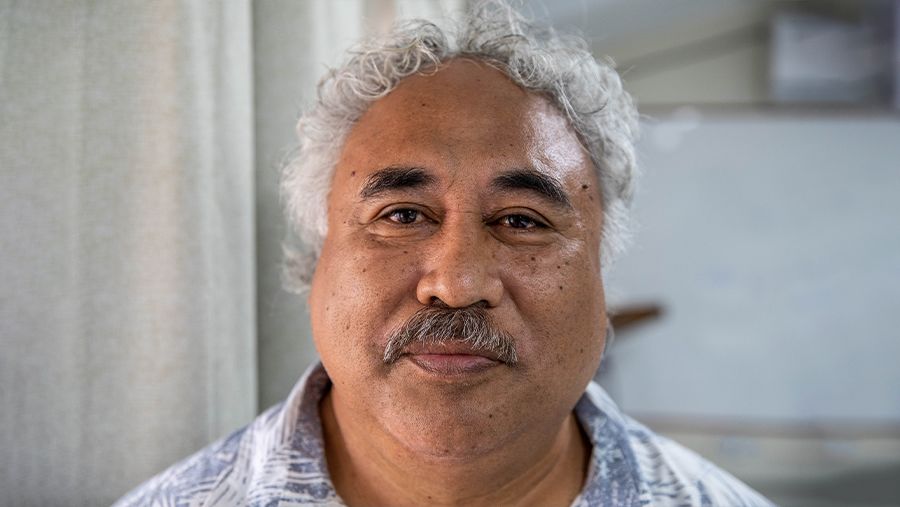
Director of Public Health Services Dr Tereapii Uka.
Director of Public Health Services Dr Tereapii Uka.
The second the shuttle door opens, he looks for the expression on their faces: “They’re happy, yelling, shouting ... Many just can’t wait for their second dose.”
“I’m so grateful.”
“The lives of the general population changed” because of Covid-19 – even with no cases – so just the suggestion of normality is something many are welcoming with open arms.
The more people vaccinated the better, he says, because if Covid-19 hits the Cooks, “the whole country will be affected”.
“With the border closed, [the] economy and businesses affected, food will be a problem. There will be nobody to provide for the families.”
Cook Islanders “know how to survive”, he says – they can fish for food, and use the land to plant. But the ongoing economic hit would be tough.
University of Auckland Associate Professor Collin Tukuitonga, Pacific public health specialist and associate dean in the Faculty of Medical and Health Sciences, was in the Cook Islands before the bubble opened to help assess the country’s preparedness.
Contact tracing was “not quite up to it”, but has since been bolstered. With only nine community nurses to do all the work, they “just didn’t have enough people”.
The nation has a “very small” health service, with about 17,000 people sharing about 19 doctors, 11 nurses and four ventilators.
Puna (community health) clinics dotted across the island’s five districts have shut their doors for 10 weeks, as staff have been deployed to help facilitate the vaccine roll-out and maintain services at the hospital.
“Clearly if there was an outbreak, it would need to be supplemented in some way,” Tukuitonga says.
Two doctors, four nurses and a pharmacist are being sent to the Cook Islands from New Zealand on two-week rotations as part of a Medical Assistance Team.
Clad in matching cargo jumpsuits, the team moves between the hospital and Tupapa. While not part of the vaccinator workforce, they ensure essential health services are maintained.
While local doctors and nurses do the best with what they have, they are limited in terms of staffing and resources.
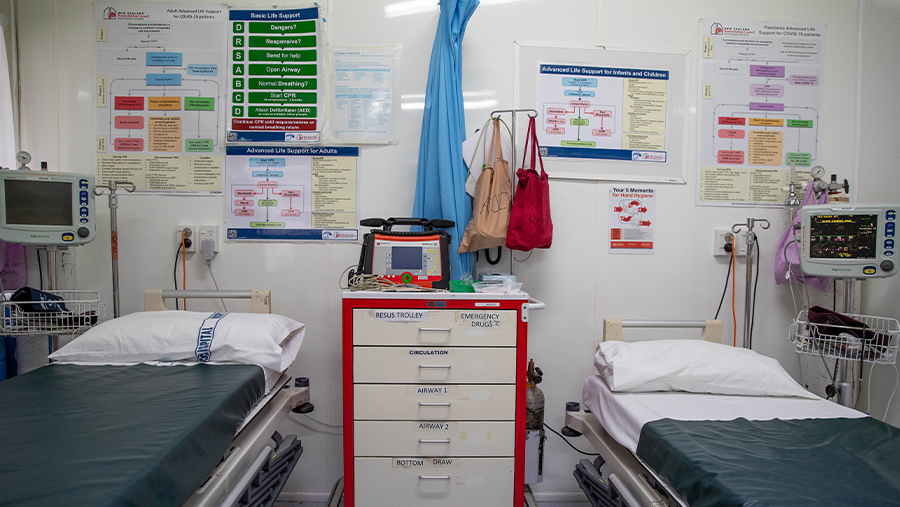
Inside Tupapa clinic’s two-bed emergency department.
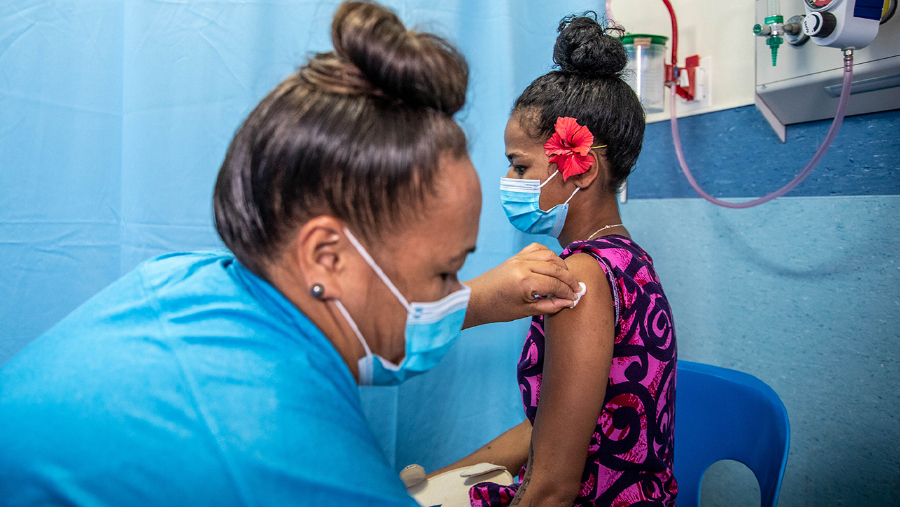
Protecting the Cook Islands from Covid-19 is critical, health officials say.
However, the Cook Islands have a leg-up on tracking people down, Tukuitonga says.
Everyone knows everyone — something that becomes apparent when you walk the main drag, or visit the Saturday morning market.
It’s hard to say what the country could and couldn’t handle, but “it wouldn’t take much to overwhelm them”.
“Ten cases in Auckland doesn’t matter so much. Ten cases in Rarotonga is a big deal,” Tukuitonga says.
“It’ll be an exercise, for sure.”
That concern was realised sooner than many had hoped when a Cook Islands man tested positive for Covid-19 in Rarotonga on June 5, after travelling from Egypt via Auckland in May.
But tests deemed him a historical case so he will be added to New Zealand’s tally, instead of the Cook Islands’.
Speaking to those coming to be vaccinated, it is clear some are nervous.
Their fears are similar to those expressed around the world: The vaccine is new, it was developed quickly — is it safe?
Outward anti-vax sentiment appears uncommon, but misinformation is circulating.
Eric Toleafoa is a member of the Religious Advisory Council, a board that advises government and traditional leaders on religious matters — a core tenet of life for most Cook Islanders.
Council members were among the first to receive the vaccine, as a show of faith that “this is safe, [and] a responsibility as Christians that we should participate in”.
“Covid ain’t going away any time soon. It’s important we can do whatever we can to protect ourselves in order to protect others, especially the vulnerable,” Toleafoa, who heads the Seventh Day Adventist Church, says.
While many are supportive, misinformation about the vaccine, largely from social media, is starting to appear.
“There is some misinformation. There are some people out there who are thinking that by going to these doctors that it’s a lack of faith. People question the healing power God can provide as well,” he says. “I don’t believe that’s true.
“It’s important that we understand the purpose of the vaccine is to protect us and those around us.”
The vaccine roll-out is critical amid the injection of tourists, he says.
“By protecting ourselves, we can allow others to come and enjoy the paradise we have here.”
Despite concerns of Covid-19, Cook Island businesses are happy to see tourists back again.
Ready to welcome those tourists is the Little Polynesian resort.
Perched on a stretch of golden sand in Titikaveka, it has recently awoken after more than a year lying dormant.
The 14-room high-end hotel, alongside Pacific Resort Hotel Group’s three other offerings, has been empty since the border closed.
The group's chief executive Marcus Niszow gets misty-eyed speaking about going to get his vaccine.
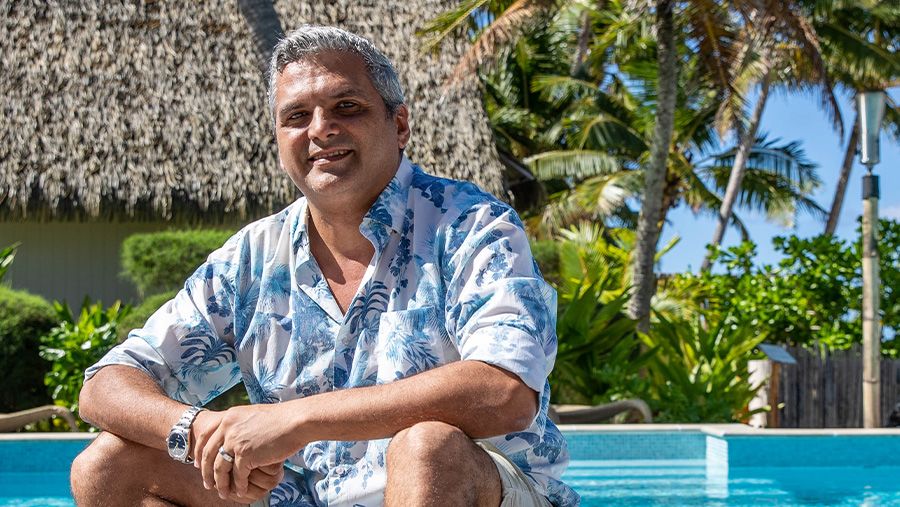
Pacific Resort Hotel Group chief executive Marcus Niszow.
Pacific Resort Hotel Group chief executive Marcus Niszow.
Niszow's adult children, half a world away in Santiago, Chile, were fully vaccinated months ago, and have been waiting for word on when Dad would be too.
It is evident the day carries weight for him after everything the company has been through. He is "stoked".
After record occupancy levels in 2019, last year hit hard.
"It was a really difficult and tough time for our team … this was definitely the worst-case scenario end of the spectrum.”
That the vaccine is finally here "has really given us some peace of mind” and he is upbeat about the future now the travel bubble is open.
It will be a while before they break-even – they are nearly $3 million in the red – but "we're on the road to recovery".
Now operators are working again, any border closure or pause on travel due to an outbreak could be devastating, he says.
"Having that extra layer of protection means we have a better chance of getting through this, and that the stop-starts will be few and far between.
"We're blessed."
That’s a sentiment shared by businesses across the island.
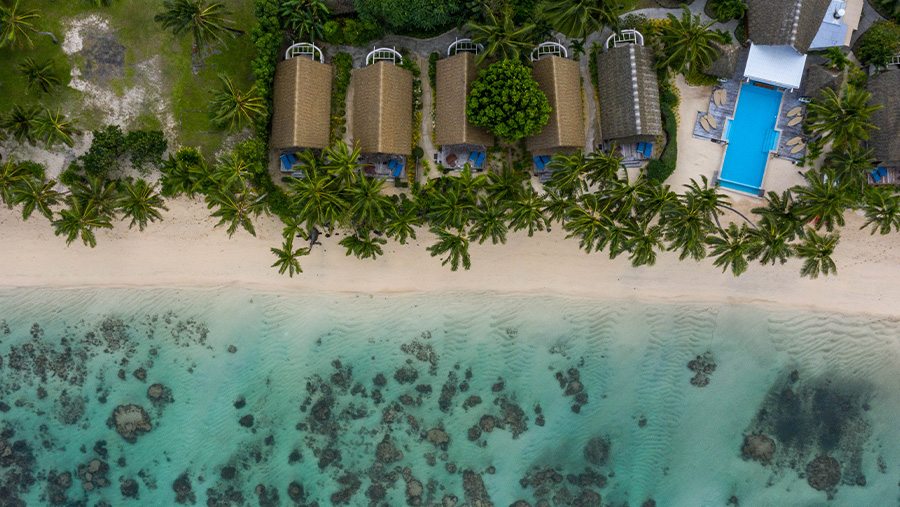
Empty stretches of sand are ready, waiting for tourists to return.
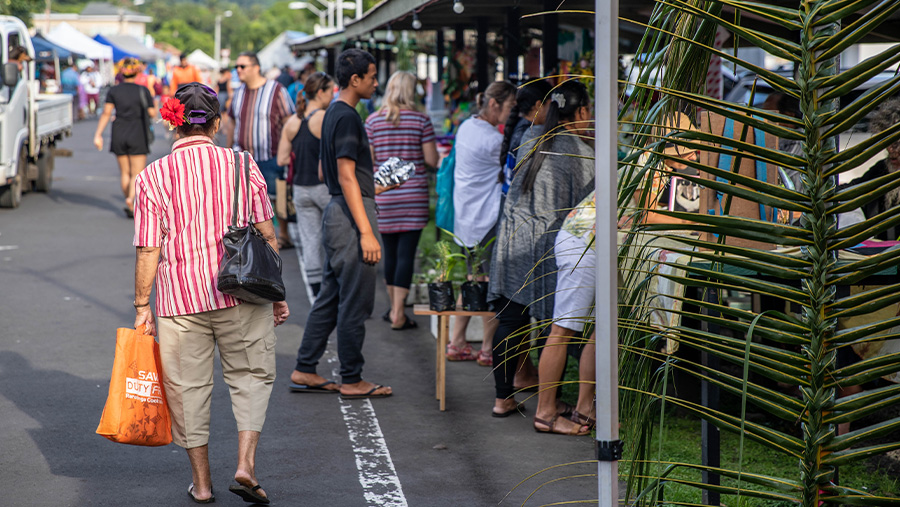
Sealing the borders for more than a year has done a number on the local economy.
Standing on the sand overlooking a pristine passage of water, guides from Ariki Adventures are giving their first sea scooter safety briefing to tourists in more than a year.
Kave and Jules Tamaariki, originally from Wellington, have been running the marine tour service, offering paddleboarding, snorkeling and sea turtle safari tours, for more than six years.
Pre-Covid they were operating 2-3 tours a day.
It was "full on", Jules Tamaariki says, sitting outside the cafe where they feed ika mata (raw fish) and garlic bread to tourists who work up an appetite at sea.
When Covid-19 first emerged, many thought they would be in the clear by May.
"Then May was June, then June was July ..."
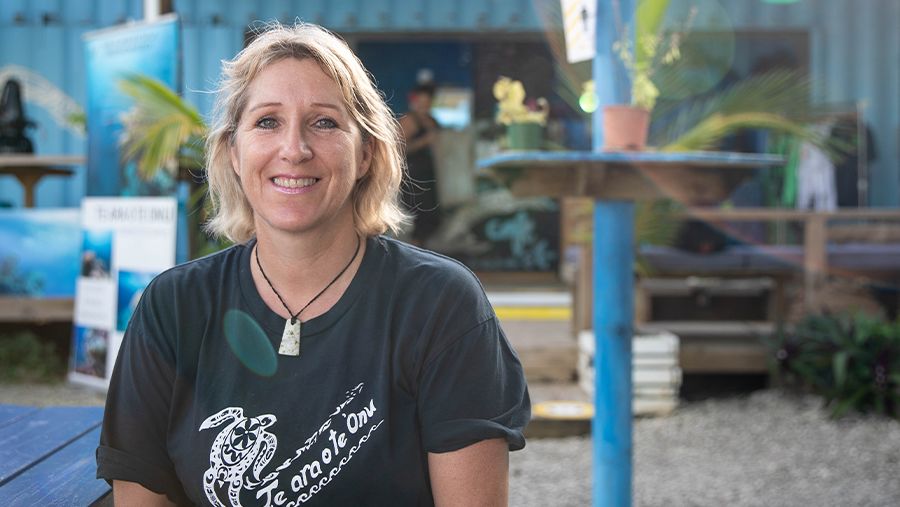
Ariki Adventures managing director Jules Tamaariki.
Ariki Adventures managing director Jules Tamaariki.
Business dried up overnight. They were kept afloat by the wage subsidy which is set to finish at the end of this month.
"Without it, we would have gone home – to our old homes – a long time ago."
Hundreds of metres offshore, weaving between coral reefs, duck-diving towards reef sharks and green sea turtles, the team are in their element — finally able to resume doing what they love.
Covid-19 would have been “devastating” for the Cooks, she says. "We're one big village. It would have been around in a flash."
That's a threat Tamaiva Tuavera – Captain Tama, as he is better known – remains wary of.
Overlooking the crystal-clear Muri Lagoon, the Cook Islands flag is flying for the first time in 15 months.
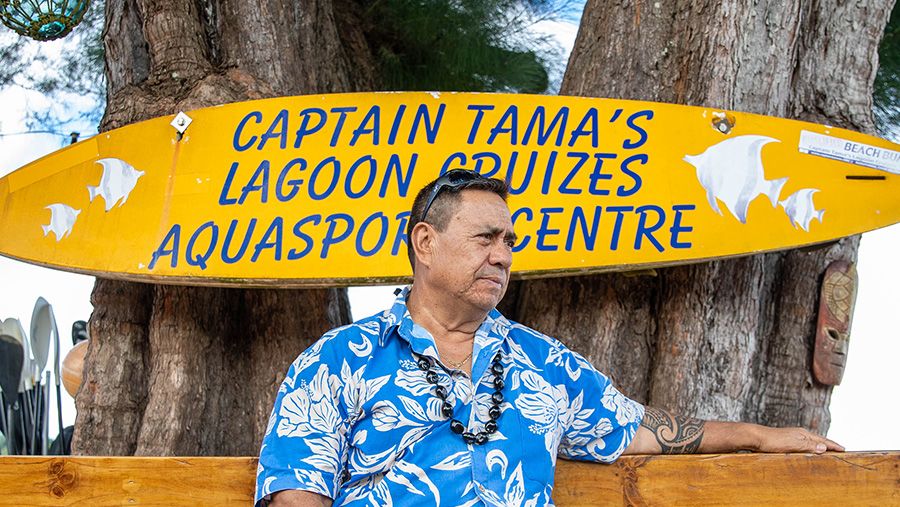
Cook Islands MP and business owner Tamaiva Tuavera
Cook Islands MP and business owner Tamaiva Tuavera
"That tells us a lot about what's been going on," Tuavera, who has been running Captain Tama’s Lagoon Cruises since 1992, says.
Speaking on the eve of its first tourist cruise since the border closed, Tuavera hopes it will be busy again soon but doesn't count on that happening overnight.
Of 16 staff, only five remain on the islands. The rest have taken up work at a freezing works in Invercargill until business is booming again.
While Tuavera, MP for Ngatangiia village, is grateful vaccines are available, he questions why the roll-out didn't start sooner.
He has "deep concern for the safety of my people", and wanted Cook Islanders to have a fighting chance at being protected before the border opened.
Tuavera received his first dose of vaccine in the first days of the roll-out but "even now, I don't feel safe".
"It's just another jab until you get the second one, that's the protection part."
Though he's assured New Zealand would be a helping hand in the event of an outbreak, one question endures: "How many of our people will get sick?"
"Even during the [changing alert levels] people were still hugging each other and kissing – that's what scares me. Our happy-go-lucky lifestyle.
"I pray to God that everything will be fine."
Four weeks on from those first doses arriving, the end of the vaccine roll-out is in sight. As of June 9, more than 9500 doses have been administered across Rarotonga and Aitutaki. The second doses started on Tuesday.
But in welcoming that historic flight, Prime Minister Mark Brown warned: "This is just the start, there's a few more hard yards for us to get through.”
While the Cook Islands is not yet ready to open its doors to the rest of the world, it gets closer each day.
Hannah Martin and Ryan Anderson’s travel to the Cook Islands was supported by nib New Zealand, through a health scholarship awarded to Hannah at the Voyager Media Awards.
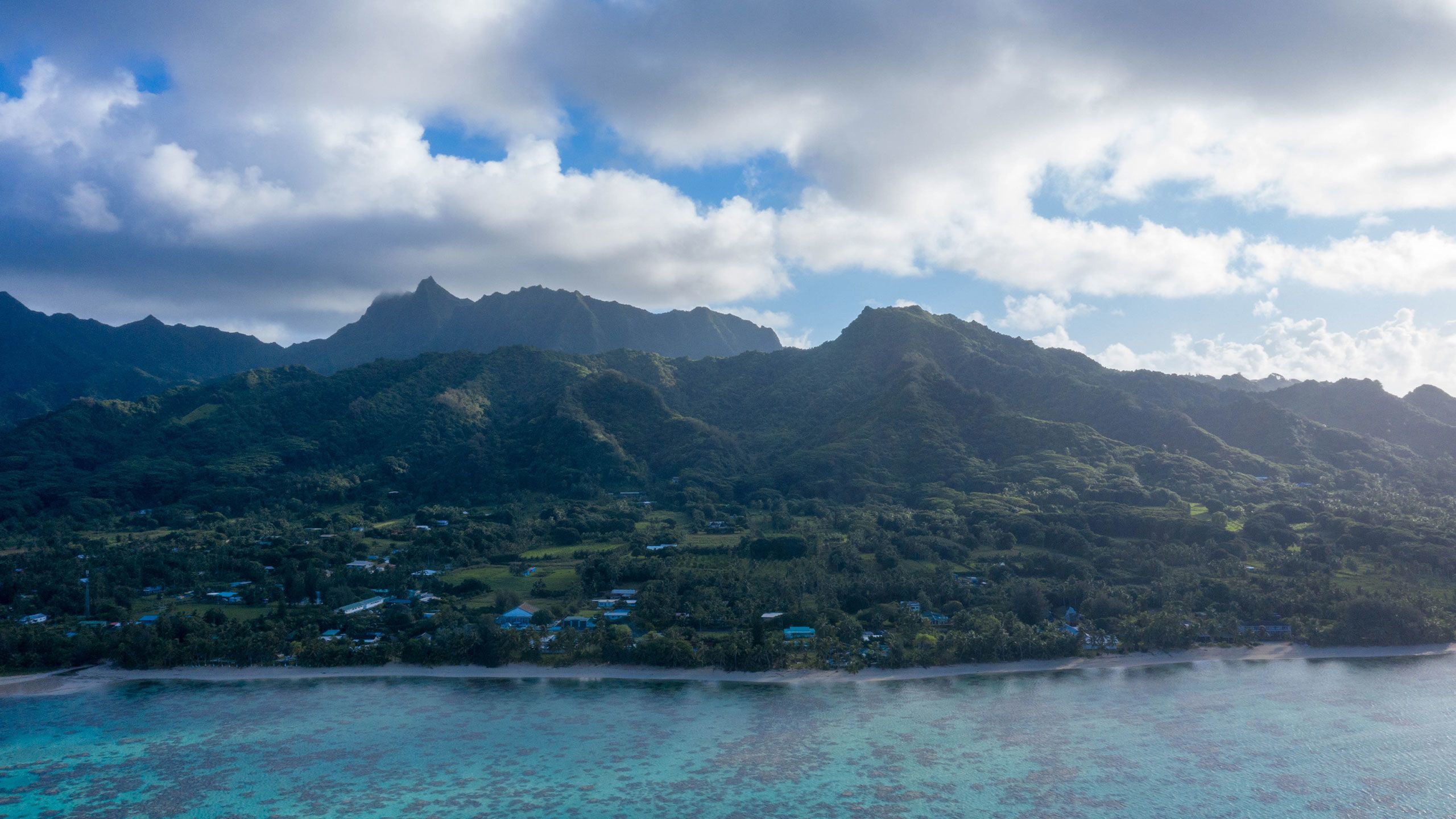

The Covid-19 pandemic has brought with it a plague of falsehoods and divisive rhetoric. Stuff is committed to independent reporting based on science and facts.
But we need your support to do it. The way we fund the reporting you rely on - the data analysis, the live streams, the investigations, the email newsletters and more - is under pressure.
If you value fact checking and accuracy, please become a Stuff supporter today. You can make a contribution from as little as $1.





